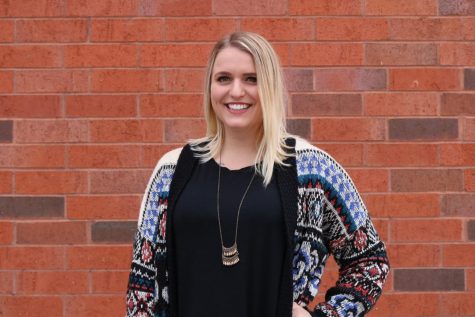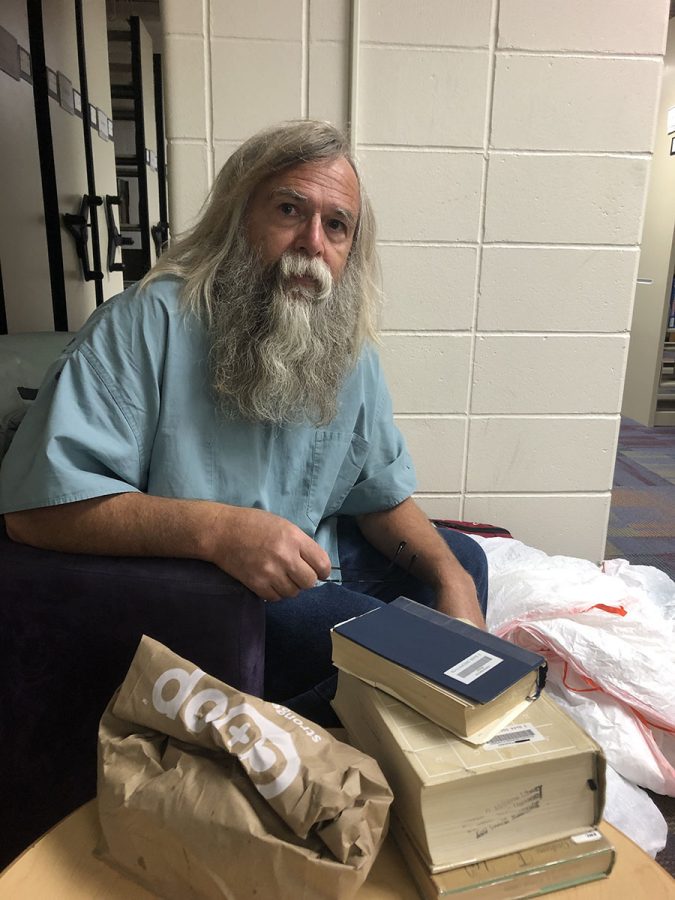Local library breaks down barriers
L.E. Phillips Memorial Public Library now to offer social services to help the homeless
Photo by Taylor Reisdorf
Scott Mikulencak is one of the many individuals experiencing homelessness that turns to libraries for shelter, warmth, water and knowledge. He said he goes to McIntyre Library almost every single day.
“I hope I’m not making you uncomfortable,” Scott Mikulencak said as he got situated on one of the velvety chairs located in the lower level of McIntyre Library.
Mikulencak — who is from Bellingham, Washington but has a long familial history in Wisconsin and has been in Eau Claire permanently since last October — said he has been experiencing homelessness for about 40 years. However, he said he wouldn’t necessarily consider himself “homeless.”
He has, over the years, been regularly housed in various apartments and homeless shelters, Mikulencak said. Since coming to Eau Claire, thanks to the Sojourner House, Mikulencak said he hasn’t gone a night without a roof over his head.
During the day, when the Sojourner House is closed, Mikulencak — when he’s not swimming in the Chippewa River or climbing trees — said he spends most of his time in local libraries, “in spite of the weather or because of it.” Mikulencak said he particularly prefers the lower level of McIntyre Library.
Mikulencak said he preferred the campus library in Bellingham, too. He said he enjoys the people he encounters and the variety of books — especially those in French and Spanish — that he has access to. He’s particularly fond of Voltaire and Kenneth Grahame’s “Wind in the Willows,” he said.
However, he was also banned from the Eau Claire public library for a year because of something he was looking at on the internet, he said.
“Everyone is welcome at the library,” Pamela Westby, the director of L.E. Phillips Memorial Public Library, said. “Proof of residence is not required to be in the library or use the library. Since proof of residency is not required, we don’t know for sure if someone is experiencing homelessness unless they tell us. Everyone has a right to access library services. However, all customers (regardless of living situations) must follow the customer services guidelines and policies…”
Libby Richter, a licensed social worker who entered her role as the Community Resources Specialist at L.E. Phillips Memorial Public Library in April, said it has been found that individuals who are struggling — be it with mental health, housing, substance use and so on — often organically find themselves in libraries.
“The library is a safe place; it’s a quiet place,” Richter said. “It’s a place where individuals have freedom to access knowledge and information that wouldn’t otherwise be available. You can’t get in trouble for loitering at a library. It really is a place for everyone.”
Since she began working at the public library, Richter said she has had about 150 contacts with individuals — some new and some repeat. While not all of those contacts were with individuals experiencing homelessness, Richter said more than half of them were.
Richter said she is available to help individuals fill out and submit housing applications or connect them with healthcare, food, mental health, drug rehabilitation and similar services.
Her job is really about breaking down barriers and helping individuals who are struggling become the best people they can be — to help them obtain, but more importantly maintain, a productive lifestyle, Richter said.
“There are needs in our community that are not getting met,” Richter said. “We have people that get overlooked for services, or people who don’t quite qualify for the services they need. Sometimes the available services just don’t meet the person’s needs fully. Little things can become big barriers that prevent people from getting the services they need.”
Westby said Richter was hired at the public library because the reported incidents there were growing in quantity and severity.
“We met with Risk Management, worked with the (police department), offered various staff trainings, added procedures and scripts, researched what other libraries were doing for security vs. social worker models,” Westby said. “We discussed it with the library board and determined that the Whole Person Librarianship model was best for us.”
The Whole Person Librarianship model, according to the Whole Person Librarianship website, is centered on the fact that librarianship and social work hold similar values and strive towards similar outcomes.
“Social workers and librarians are really compatible,” Richter said. “We can’t do each other’s jobs fully, but we have the same passions. When it comes down to our core values, social work and librarianship both have service — service to the people — as their No. 1 core value.”
Richter said that 10 years ago, San Francisco was the first city to officially hire a social worker at a library. This decision was proactive, she said, and proved preferable to the alternative, more intimidating option of posting security guards at the door. Eau Claire’s public library was the first in Wisconsin to hire a social worker, Richter said, and there are only 40 other hired positions like hers nationwide.
Richter said she has worked at libraries regularly throughout her life. She worked as a Library Page (someone who shelves books) at the Menomonie Public Library when she was in high school, and she worked in a couple different areas at McIntyre Library during her undergraduate career.
She said since the public library is more immersed in the greater community, it’s not as obvious when an “outsider” is present, so she gets complaints that are slightly different but handles them the same way.
“People have made complaints in the past, saying “I’m uncomfortable with that in the library,”” Richter said. “Very dehumanizing things. It’s because people are uncomfortable seeing someone struggling outright. That’s a hard thing for any of us to face but these are public spaces and we want everyone to feel welcome. We need to be wary about some individuals, we want everyone to be safe, but everyone has a right to be there.”
Jill Markgraf, the director of McIntyre Library, said library policies aren’t directed at certain groups but at individual behaviors. However, the needs and safety of students take the forefront. Running the library becomes a balancing act between student needs and the fulfillment of public service, she said.
“People bring different experiences that influence their sense of safety, especially in the presence of people who look or act differently,” Markgraf said. “When these complaints come to us, we try to identify if there are behaviors that are cause for concern and address those. We will often talk with a library guest about behaviors that are disruptive. We work closely with University Police, especially if we get repeated complaints, or the behavior is concerning.”
Mikulencak said overall, he feels welcomed when in the campus library and feels that Eau Claire provides him with adequate resources to live a “copeable” life.
Milulencak said he really just enjoys the outdoors and nature and came to Wisconsin, first and foremost, for the sunshine. He said he finds a way to “cope” with being outside in Wisconsin’s brutal winters by noticing the small things, like a rabbit casually munching on its breakfast in 30-below weather, that make life more enjoyable.
He also said he has had numerous interactions with library employees and campus police, but that he doesn’t mean any harm.
“I have the gift of gab,” Mikulencak said. “I’ve gotten in trouble on more than one occasion for talking to people while they’re trying to study.”
Mikulencak said he is aware of the stereotypes that come with homelessness and the expectations people have.
Richter stresses the importance of “person-first” language when it comes to homelessness. Using this kind of language is humanizing and can help foster empathy, she said.
“These are community members,” Richter said. “These are people just like us.”
Reisdorf can be reached at reisdotr3201@uwec.edu.

Taylor Reisdorf is a graduate student in the English program who revels in both telling and engaging with compelling stories. This is her seventh semester with The Spectator. She prides herself in her adaptability and desire to continuously experience, learn, and appreciate new things.


